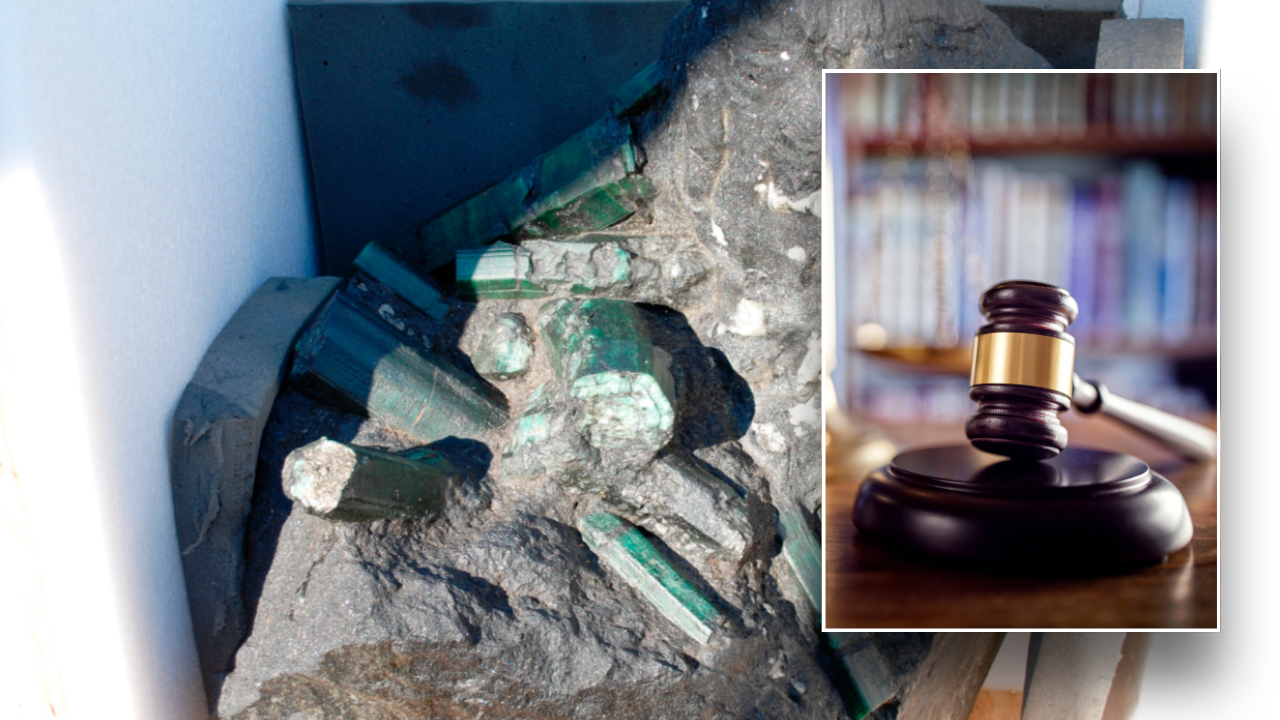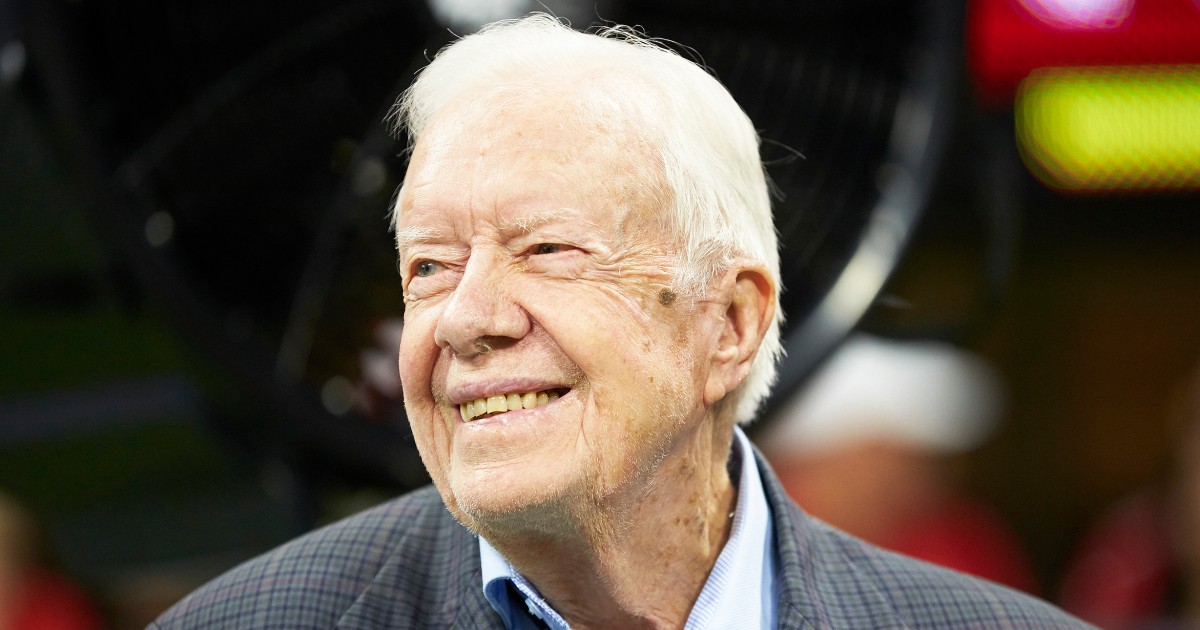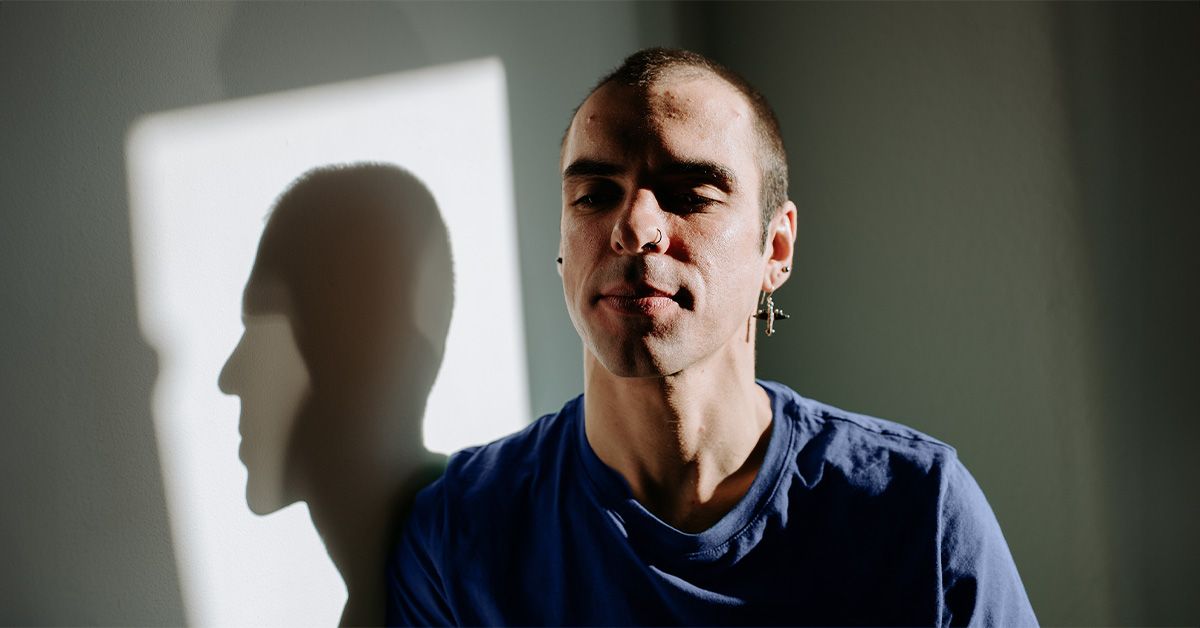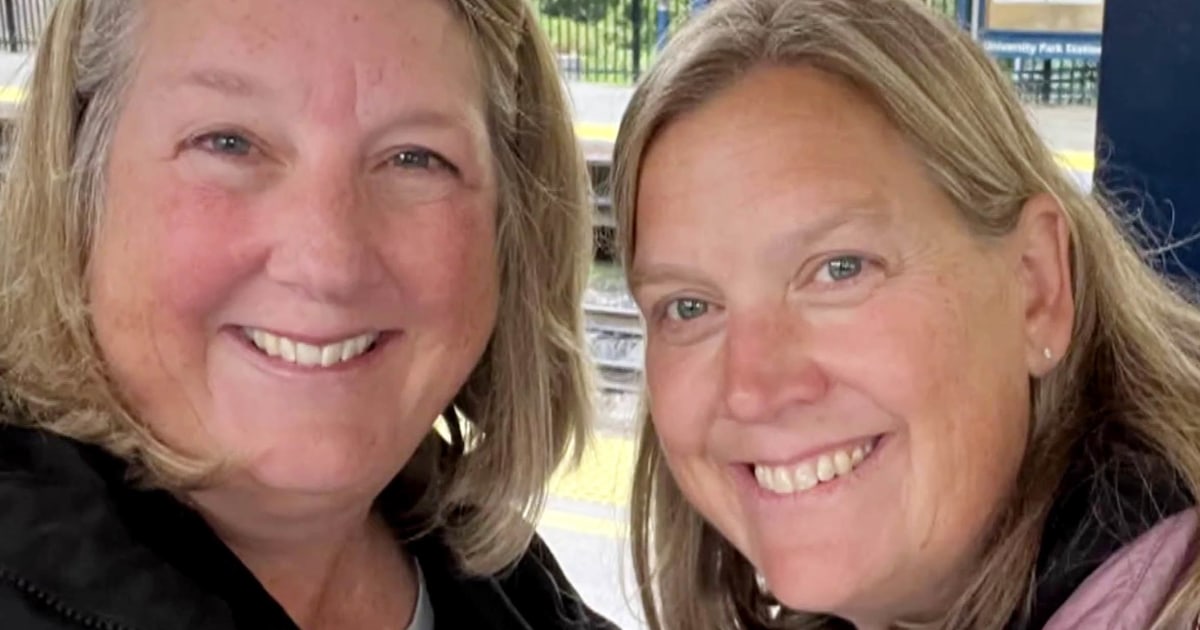Welcome to the centenarian club, Jimmy Carter.
The longest living president in U.S. history turns 100 on Tuesday, Oct. 1, becoming the first commander-in-chief to reach the century mark.
Active until his late 90s, Carter has shown remarkable staying power. He has survived cancer, a series of falls and the death of his beloved wife of 77 years, Rosalynn.
When he entered hospice in February 2023, his family thought he had only days to live. But Carter continues to spend his remaining time at home in Plains, Georgia, choosing to forego additional medical intervention.
His last public appearance was at his wife’s funeral in Atlanta in November 2023.
Jimmy Carter today
There’s been “virtually no change” in the former president’s condition since he went into hospice 19 months ago, his grandson, Jason Carter, told 11Alive, the NBC News affiliate in Atlanta, on Friday, Sept. 27.
He described Jimmy Carter as doing well, but “very physically diminished,” in an interview with Boston public radio earlier in September. Emotionally and mentally, the former president is “still there and participating in the world,” he added.
“When my grandmother passed, he was honored and happy to have been there with her until the end, but I think he had a real low moment for some months,” Jason Carter said.
“And lately, he’s been much more engaged in politics and in the news and emotionally engaged with all of us.”
Jimmy Carter told his family he wants to vote in this year’s presidential election.
Having such a goal can be “a pretty potent factor” in helping someone live longer, says Dr. Thomas Perls, a geriatrician and professor at Boston University Chobanian & Avedisian School of Medicine who studies longevity.
“That purpose in life and what he has said about wanting to get at least through the election is really, really inspiring and I think very important for him,” Perls tells TODAY.com.
“He has amazing resilience that’s carried him to this point.”
Why Jimmy Carter is living longer than expected in hospice
Patients go into hospice when doctors believe they have six months or less to live, Dr. BJ Miller, a hospice and palliative medicine physician in San Francisco, previously told TODAY.com. He is not treating Carter.
The focus becomes comfort care to ease any suffering, which includes medicine to alleviate pain, nausea or anxiety.
But it’s very difficult for doctors to pinpoint how much time a terminally ill patient has left, so they’re always guessing, Miller noted.
It’s “not rare” that people live longer in hospice care than expected, like Carter, Miller says. He’s seen it many times in his own practice.
“It really demonstrates we’re not in charge,” Carter’s grandson said.
Jimmy Carter health
The former president has a complicated family medical history.
His mother lived to be 85, but his father died at 58 of pancreatic cancer. Both his sisters and his brother also died of pancreatic cancer, and his mother had the disease as well, NBC News reported.
In 2015, Carter was diagnosed with melanoma that had spread to his liver and brain. He received immunotherapy treatments with Keytruda — a new cancer drug at the time — was treated with radiation to his brain and had a large tumor on his liver removed. Scans showed no evidence of the cancer within months.
In 2019, he had a series of falls that led to broken bones and required surgery.
Jimmy Carter’s longevity habits
Perls, who heads the New England Centenarian Study, believes about 10% of people can live to 100.
Such longevity involves a complex combination of genes, behaviors, environments and chance across many years and situations, says Howard Friedman, Ph.D., author of “The Longevity Project” and professor emeritus of psychology at the University of California, Riverside.
Some key patterns that play a role in longevity may apply in Carter’s case, he adds.
Here are some of the lessons from the president’s long life:
Sense of purpose
Carter and his wife were famously involved in the community, helping to build, renovate and repair more than 4,300 homes in 14 countries while volunteering for Habitat for Humanity since 1984.
The work gave him joy, the former president wrote in one of his books.
“Community involvement tells you that you want to live, you want to help other people,” Valter Longo, Ph.D., professor of gerontology at the University of Southern California and director of the USC Longevity Institute in Los Angeles, previously told TODAY.com.
“In the end, (it’s) whatever gets you out of bed.”
Always looking for new challenges
After leaving the White House, the former president and his wife founded the Carter Center in Atlanta to advance human rights and alleviate human suffering.
He traveled all over the world as part of that mission, wrote books and volunteered.
Carter learned to downhill ski when he was 62, his wife revealed when the couple was interviewed for the book “What Makes a Marriage Last.”
“Jimmy doesn’t want to just learn about things, he wants to do them,” Rosalynn Carter said.
Strong family ties
Carter and his wife were married for 77 years — the longest-married couple in presidential history. Carter called it “a full partnership.”
“Rosalynn was my equal partner in everything I ever accomplished,” Carter said in a statement when she died on Nov. 19, 2023.
“She gave me wise guidance and encouragement when I needed it. As long as Rosalynn was in the world, I always knew somebody loved and supported me.”
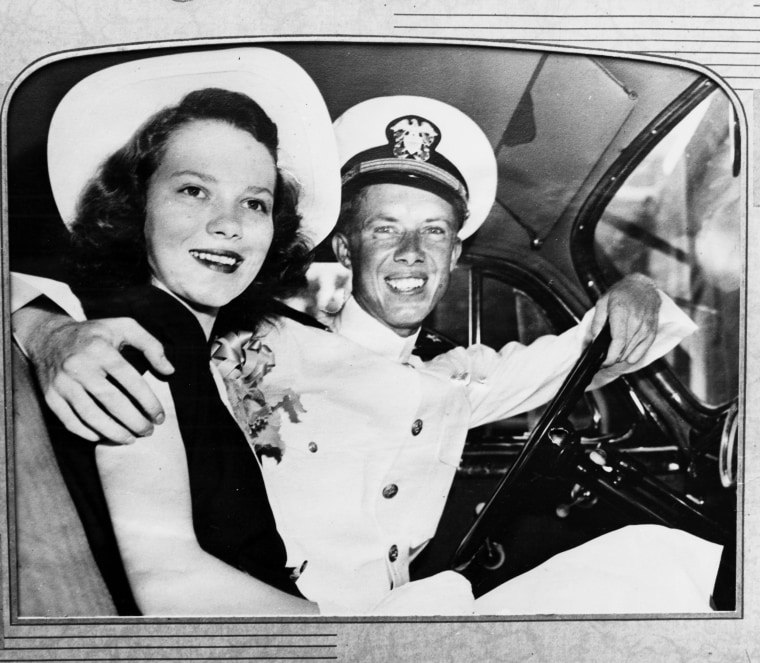
During Rosalynn Carter’s tribute service, the couple’s daughter, Amy Carter, read a love letter the former president had written to his wife 75 years earlier.
“My darling, every time I have ever been away from you, I have been thrilled when I returned to discover just how wonderful you are,” part of the letter read. “When I see you, I fall in love with you all over again.”
Their children, grandchildren and great-grandchildren complete the tight-knit family.
Regular exercise
Carter was an avid runner until he was 80 and developed knee problems, so he switched to swimming and walking, he told The Washington Post in 2013 and 2018.
He and Mrs. Carter liked to ride bikes in their hometown as well as on trips across the country and abroad. The former president also enjoyed fly-fishing and woodworking, according to his biography.
A pattern of physical activity across long time periods that keeps a person moving about is important for longevity, Friedman notes. It doesn’t necessarily have to be formal exercise, but could be activities like farming, construction projects and being on the go, he adds.
At least 30 minutes a day of moderate to vigorous physical activity is one of five habits that can help people live longer, a study in Circulation found. The other habits were never smoking, staying at a healthy weight, moderate alcohol intake and a healthy diet.
Outgoing personality
Centenarians tend to be extroverted, meaning they’re able to establish friendships and healthy social networks, Perls says.
That means they’re cognitively active, less lonely and have someone to turn to when they need help.
“Certainly, President Carter was about as gregarious as you can get, and probably the most caring and empathetic president that I’ve ever experienced in my lifetime,” Perls notes.
A viral video showed a 92-year-old Carter shaking hands with everyone on a plane as he boarded the flight.
People who live a long life also tend to have a conscientious, dependable, prudent personality that keeps strengthening across the years, Friedman adds.
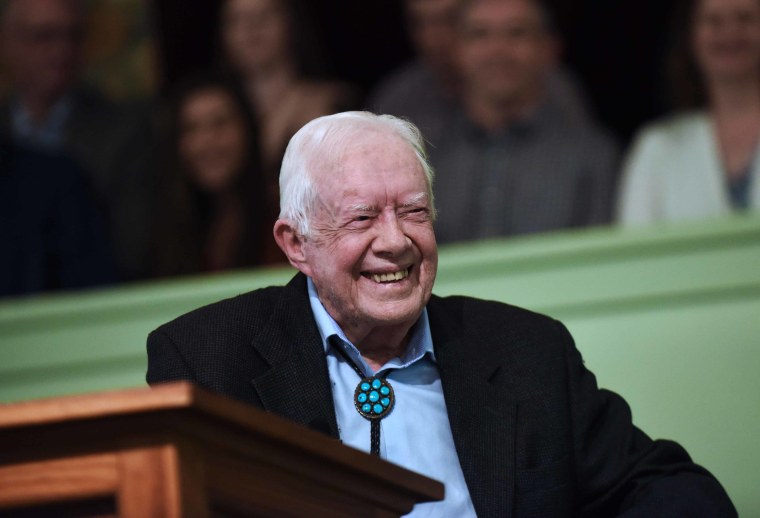
Resilience
The former president has survived health setbacks, the death of his wife, and more than a year-and-a-half in hospice.
“It speaks to his resilience,” Perls says, an important factor in longevity.
Mental resilience is about developing a long-term pattern of persistence, purpose and positive social relations, Friedman adds.
Faith
Since leaving the White House in 1981 until 2020, Carter regularly taught Sunday school at Maranatha Baptist Church in Plains, Georgia, where he and his wife attended services.
“Our religious beliefs are important to us,” the former president wrote in one of his books.
Spirituality can put the focus on gratitude, and often means associating with other helpful, healthy, positive people, Friedman points out.
Faith may also help Carter manage stress better, Perls says.
It can be a source of meaning and belonging, which is good for the body and soul, Miller added.
“We can push and prod at the body to keep going in all sorts of ways. But if there’s no spark, if there’s no reason to live, if there’s no joy in living” it won’t help much, he says. “Those are essential ingredients for life.”
Read the full article here



:focal(1347x419:1349x417)/origin-imgresizer.eurosport.com/2024/11/24/4065325-82444148-2560-1440.jpg)


